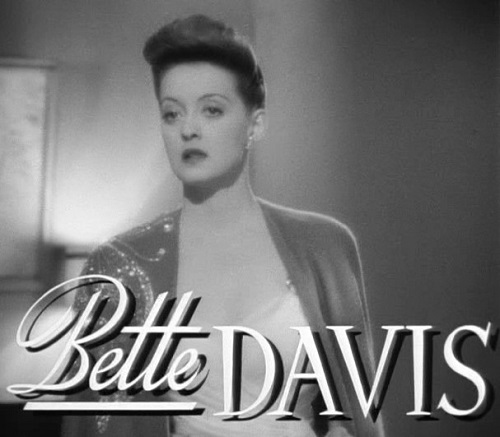It’s never surprising that when doing online research, I will find myself tumbling into internet rabbit holes.
I’ve been reading up on The Man Who Came to Dinner by Kaufman & Hart after watching the movie with Bette Davis. There’s a scene part way through where Davis’ character loses a gambit to save her lover from the conniving movie star played by Ann Sheridan. Davis has almost no lines in the scene but you’re very much aware of her presence and watch her reactions as her dreams fall apart. Under Sheridan’s attack, Davis visibly shrinks in on herself. Her character knows she’s beaten.

I next started researching Davis and her work. This led me to reading Martin Shingler’s article, “Breathtaking: Bette Davis’s Performance at the End of Now, Voyager” which discusses the melodrama inherent in her work. Then it occurred to me that I don’t consider Davis’ work to be melodrama. It’s just, well, awesome. It’s definitely a heightened reality but it is also a truthful performance which I felt exempted it from the melodrama category.
One of the few contemporary performers that I’ve seen capture that style of performance from Davis’ hey day is the female impersonator, Charles Busch.
The mellerdramas I’ve watched were overblown for comic effect. I’d read somewhere that Victorian performances weren’t like that. Rather they were done earnestly and somewhere along the way the ironic detachment became the performance.
After citing several reviews of Now, Voyager Shingler broke down Davis’ performance of that classic film:
The final scene from Now, Voyager reveals Davis to be in total command of her vocal technique and able to use it to tremendous effect. She seems to know exactly how to pitch her voice and how to vary volume and tempo in order to convey changes in the character’s mental and emotional state.
It is a bravura display, as she glides through her character’s ever-changing thoughts and emotions, all subtly conveyed through the actress’s body and voice. One of the most remarkable aspects of this performance is the fact that the scene culminates in a line of dialogue that some consider one of the corniest in Hollywood history.
Yet the strength and subtlety of Davis’s performance makes it possible to accept the line when it comes as a truthful and heartfelt expression.
Remarkably, the infamous final line, “Oh Jerry, don’t let’s ask for the moon, we have the stars!” hardly feels like an aphorism at all. Somehow Bette Davis makes one of the great rhetorical flourishes of Hollywood melodrama seem real.
From here Shingler explores the nuances of Davis’ work in creating that scene. Language is an everyday tool to make our way in the world that we give little thought to. But to truly focus on a section of text and really see how sentences are structured, the shape of chosen words, and how variations in pronouncing them can color the meaning of the message is sheer delight. It gives you an awareness of how flexible language is. It has a power to influence people’s opinions or to get them to pass the salt.
It is instructive to pause here and consider the kinds of critical decisions Bette Davis had to make in order to play this scene. For instance, she had to decide which lines and which words to emphasize. She had to consider how to vary the rhythm of her speeches using differences in pace, pitch, tone, and volume: for example, which words to whisper, which to project firmly or even loudly. She had to work out the best places to pause and decide in which pauses to breathe. She had to think about how much breath to use. She also needed to consider when to move, and, when speaking, where to look: up or down, at or away from her costar.
When my first play was being produced by classmates in college, we engaged in similar work in the rehearsal process. There is never time to spare and yet Kimberly Bouchard, the director, chose to spend several of those days on the opening monologue. She had the actor slow down her reading to the point that each phoneme was isolated. Then she sped up, tasting the shape of sounds and how each was articulated.
There is a Royal Shakespeare Company series led by John Barton that discusses close text analysis of Shakespeare’s works. It was on You Tube last I’d check and is fascinating to watch. Of course, it doesn’t hurt that it is populated with RSC alumni that I’m quite familiar with from film & tv. https://www.npr.org/templates/story/story.php?storyId=105518406
Diving in to savor the minutia of a script and pulling back to incorporate all the pieces into a performance never gets dull. There is a duality in it where one is immersed and beside a script at the same time. This idea is reflected in this final quote from Shingler quoting Davis’ 1962 autobiography.
…. Davis wrote: With young actors who talk about becoming the character and losing themselves in a role, I must argue. There is a part of you that must hold the reins and control the projection. There is a part of you that must be aware of pace and timing. Without discipline and detachment, an actor is an emotional slob, spilling his insides. This abandonment is having an unfortunate vogue. It is tasteless, formless, absurd. Without containment there is no art.
And it occurs to me that This Random World also deals with containers…
Shingler, Maring. “Breathtaking: Bette Davis’s Performance at the End of Now, Voyager.” Journal of Film and Video, Vol. 58, No. 1/2 (Spring/Summer 2006)